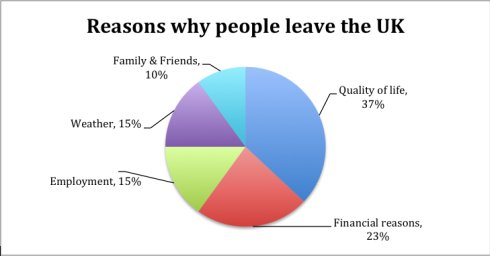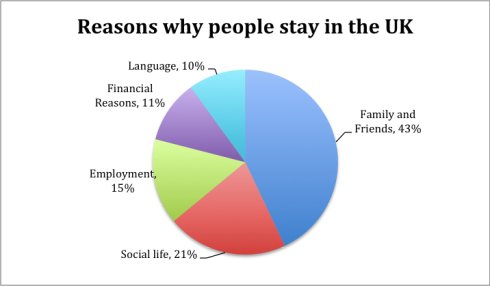2013年1月5日雅思寫作A類Task 1分析
| 圖表類型 | 餅圖(靜態(tài)) |
| 作文題目 | The charts give information about the reasons why people leave the UK and why people stay in the UK. |
| 要素回憶 | 詳見下圖。 |
| 寫作指導(dǎo) | 兩個(gè)餅圖的元素基本相同,因此兩個(gè)圖之間存在橫向比較關(guān)系,故不能獨(dú)立寫,必須合并寫。建議先寫前兩塊,在離開英國的人中,首要原因是生活品質(zhì),其次是經(jīng)濟(jì)原因,兩者加起來占60%。而在選擇留在英國的人中,家庭朋友與社會生活占據(jù)了六成。然后再寫employment在兩類人群中都占了15%。最后寫第三塊:在離開英國的人中,天氣和家庭朋友是最少的原因,分別是15%和10%。而離開英國的人中,經(jīng)濟(jì)和語言原因是最小的原因,占了約10%。 |
| 類似真題 | 劍橋真題中無靜態(tài)多餅圖。可參見2006年的真題:2003年三個(gè)國家的大學(xué)生各項(xiàng)開支在總花費(fèi)中所占的比重。 |


2013年1月5日雅思寫作A類Task 2分析
| 作文題目 | People who like to read develop better imagination and language skills than those who prefer to watch TV. To what extent do you agree or disagree? |
| 題目翻譯 | 喜歡閱讀的人比喜歡看電視的人更能培養(yǎng)想象力和語言技能。你在多大程度上同意或不同意? |
| 話題分類 | 媒體與廣告 |
| 題型類別 | 同意與否 |
| 是否舊題 | 重復(fù)2009年5月16日的題目。 |
| 話題分析 | “老題復(fù)現(xiàn)”成為了2012年雅思寫作考試全年出題的一大亮點(diǎn)。2013年的第一場考試就直接考了原封不動的老題,是否意味著今年“老題復(fù)現(xiàn)”的趨勢會繼續(xù)進(jìn)行下去,甚至愈演愈烈呢?我們拭目以待。本話題屬于媒體與廣告類話題。與2010年11月4日的題目非常相似。 |
| 類似話題 | Some people think parents should read or tell stories to children, while others think parents need not do that, as children can read books, watch TV or movies by themselves. Discuss both views and give your opinion. (101104) |
| 結(jié)構(gòu)思路 | 建議寫成雙邊支持型文章。正文第一段寫閱讀在培養(yǎng)想象力和語言技能上的作用,第二段讓步,寫電視也可以起到同樣的作用。最后給出建議,兩種方法都可采用。閱讀:文字能給讀者更多的想象空間,讀者可以把書中的人物和故事和身邊的人聯(lián)系起來,并且可以自由想想當(dāng)時(shí)的場景和人物表情、性格。電視:生動的電視畫面也可以激起人們的想象力。例如,科幻片本身塑造的就是虛擬世界,而這些畫面是讀者自己很難勾勒出來的。 |
參考范文 (來源于網(wǎng)絡(luò)) | How to educate children to be imaginative and to possess strong language skills has been one of the most discussed topics of all time. As to this issue, some propose that reading for fun can sharpen one’s language skills and stimulate one’s imagination whilst others argue that watching TV can be more effective. From my perspective, both methods can boost one’s imagination and language skills, but just in different ways. Those who believe that one’s imagination and language skills can be better developed are justified in more ways than one. Firstly, reading for enjoyment definitely can stimulate one’s imagination. Unlike watching TV, readers cannot see the vivid pictures but the lines. They have to associate the words with certain things in their mind, thereby arousing their imagination. For example, if one reads the masterpiece Romeo and Juliet by Shakespeare, he or she, invariably, will imagine how Romeo and Juliet look like and what the wall of Juliet’s house will be like. Secondly, reading for pleasure can improve one’s language skills, especially one’s reading and writing skills. Different from the words used in TV, the lines in novels or other books are, by and large, from some classical writers who are superior in words choice and grammar, both of which are critical to one’s reading and writing. Those arguing that watching TV can better one’s imagination and language capabilities are equally justifiable to some extent. On the surface, watching TV cannot develop one’s imagination simply because when watching TV, audiences merely obtain the information in a passive way. However, on a deeper level, watching TV can be beneficial to one’s imagination. Watching a Sci-Fi movie, like Star Wars, for instance, can stir one’s imagination in a better way than a traditional book can. Moreover, watching TV can sharpen our language skills as well, especially in terms of listening and speaking. Watching TV and reading for pleasure are not mutually exclusive in terms of improving one’s imagination and language. Without watching something amazing on TV first, it is basically impossible for one to imagine. Without reading, watching TV alone can stifle one’s imagination for the simple reason that they just receive information passively. Speaking, listening, writing and reading are interrelated as well. To conclude, as for watching TV or reading for pleasure, it is hard to say which is better for one’s imagination. In terms of language skills, watching TV can help people more in speaking and listening whereas reading for fun is more helpful in reading and writing. |
2013年1月5日雅思寫作G類題目分析
| Task 1 | 信件類別 | 感謝信 |
| 要素回憶 | 暫缺。 | |
| Task 2 | 考試題目 | Some people believe children should do what their parents tell them to do. Others think children must learn to think themselves. Discuss both views and give your opinion. |
| 題目翻譯 | 一些人認(rèn)為孩子應(yīng)該聽父母的話。另外一些人認(rèn)為兒童應(yīng)當(dāng)學(xué)會自己思考。談?wù)搩煞N觀點(diǎn)并給出你的觀點(diǎn)。 | |
| 話題類別 | 教育類 | |
| 類似話題 | 本題與2008 年9月27日的真題在寫法上完全相同。這是雅思寫作中出題的第三種方式:換湯不換藥,即看似是全新題,但實(shí)則跟老題寫法完全相同。Some people think parents should control the behaviour of children from a very young age but others think we should give them more freedom. Discuss both views and give your own opinion. (080927) | |
| 寫作指導(dǎo) | 建議寫成雙邊支持型。正文第一段介紹小孩聽話的好處。父母相對更有經(jīng)驗(yàn),可以指導(dǎo)孩子少犯錯(cuò)誤。正文第二段寫兒童學(xué)會獨(dú)立思考的好處。有獨(dú)立思考能力的兒童更容易培養(yǎng)獨(dú)立思考能力和批判性思維能力,富于創(chuàng)新。 |











